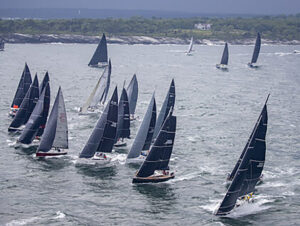
After three sailboats were abandoned during the 2024 Newport Bermuda Race and return trip, the Bermuda Race Organizing Committee has partnered with US Sailing and the Cruising Club of America to conduct an in-depth safety review. The goal was to gather facts, analyze the incidents and make recommendations that will contribute to safer offshore sailing races.
After interviewing the rescued and rescuing crews, the BROC and US Sailing have released individual reports for the three vessel abandonments. The reports provide important insights and lessons learned, reinforcing the need for preparedness, training and seamanship in offshore sailboat racing.
The sailing vessel Alliance reported water ingress via a rudder post. Many competing boats stopped racing and assisted. The crew was transferred to Ceilidh and the two crew continued to Bermuda. On July 2, the sloop Solution was on the return trip when the captain detected water in the bilge. Despite the U.S. Coast Guard dropping a high-capacity pump, the boat could not be saved. Additionally, the crew of a Sweden 41 had to abandon the boat after it started taking on water.
“We want to extend our sincere gratitude to all those who dedicated their time and expertise to reviewing these incidents in detail,” Andrew Kallfelz, race chair for the 2024 and 2026 Newport Bermuda Races, said in a statement. “The most important factor is that there was no loss of life or injury in any of these incidents. These reviews allow us to learn and apply takeaways that will not only improve our Race but also enhance safety for all offshore sailors.”
In addition to releasing the reports, BROC recently hosted a seminar as part of the 2026 Race Prep Seminar Series. The session reviewed the reports and two other key areas of review: Structural Integrity & Inspections and Communications at Sea. The full reports on these topics will be made available in the coming weeks.
“We highly encourage all sailors, offshore race organizers and offshore sailing educators to take the time to read these reports,” said Dick York, Safety at Sea Chair at US Sailing. “The crews involved demonstrated that training and preparation work to preserve life and limb. Just as importantly, their experiences reinforce that fellow competitors are often the first and most critical rescue and support system in offshore sailing. These key takeaways should continue to shape best practices for safety in our sport.”

